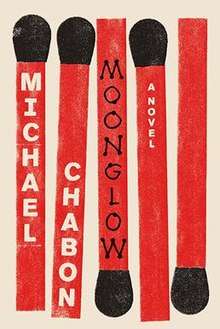Moonglow (novel)
Moonglow is a 2016 novel by Michael Chabon. The book chronicles the life of Chabon's grandfather, a WW2 soldier, engineer and rocket enthusiast who marries a troubled Jewish survivor from France and lives a challenging, wandering life in postwar America. Chabon tells the story using a mixture of strict memoir and creative fiction writing.[1] The narrator functions as a proxy for the author, Chabon.[1][2]
 | |
| Author | Michael Chabon |
|---|---|
| Country | United States |
| Language | English |
| Subject | Memoir |
| Publisher | Harper |
Publication date | November 22, 2016 |
| Media type | Hardback |
| Pages | 430[1] |
| ISBN | 978-0-06-222555-9 (Hardcover) |
Plot summary
The novel is about the story of the author's (Chabon) grandfather. Throughout the book, the grandfather's name is not referred to.
The story is sort of a memoir, jumping around in time. It starts with the narrator stating how his grandfather got arrested.
Reception
Sam Sacks writing for The Wall Street Journal appreciated the non-fiction elements of the novel in contrast to Chabon's other works. Sacks said, "Moonglow is a movingly bittersweet novel that balances wonder with lamentation."[3] For The New York Times, Michiko Kakutani found that, "Mr. Chabon weaves these knotted-together tales together into a tapestry that’s as complicated, beautiful and flawed as an antique carpet. […] Although "Moonglow" grows overly discursive at times, it is never less than compelling when it sticks to the tale of Mike's grandparents — these damaged survivors of World War II who bequeath to their family a legacy of endurance, and an understanding of the magic powers of storytelling to provide both solace and transcendence".[4]
The book was discussed in January 2017 on BBC Radio 4's Saturday Review.[5]
Moonglow was a finalist for the 2016 National Book Critics Circle Award in fiction. [6]
References
- Scott, A.O. (November 18, 2016). "Michael Chabon Returns With a Searching Family Saga". The New York Times. Retrieved December 1, 2016.
- "Michael Chabon's 'Moonglow' is a cunning dance with autobiography".
- Sacks, Sam (November 25, 2016). "Michael Chabon's Age of Heroes". The Wall Street Journal. Retrieved December 1, 2016.
- Kakutani, Michiko (14 November 2016). "In Michael Chabon's 'Moonglow,' Deathbed Stories Illuminate an Era". The New York Times. New York City. Retrieved 14 January 2017.
- Presenter: Tom Sutcliffe; Interviewed guests: Kate Williams, Maria Delgado, David Benedict; Producer: Oliver Jones (14 January 2017). "La La Land, Manchester By The Sea, Michael Chabon, Wish List at The Royal Court, Charles Avery". Saturday Review. 09:27 minutes in. BBC. BBC Radio 4. Retrieved 14 January 2017.
- Alter, Alexandra. "Zadie Smith and Michael Chabon Among National Book Critics Circle Finalists". New York Times. New York Times. Retrieved 18 October 2019.